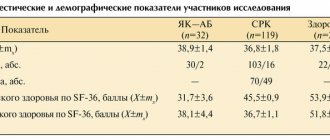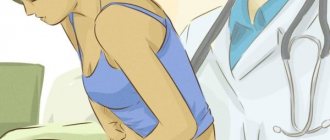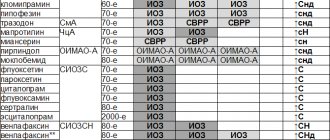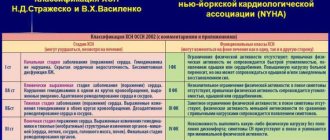The IMMA clinic provides medical services and helps get rid of many diseases, including diseases of the gastrointestinal tract. To do this, we use modern diagnostic equipment, which helps to quickly make an accurate diagnosis, and we also cooperate with experienced and professional doctors who will not only promptly identify a functional intestinal disorder, but also relieve a dangerous illness.
What it is?
Functional gastrointestinal disorder is a separate type of pathology associated with disturbances in the process of digestion of food. It can appear in almost anyone, regardless of age or gender.
The reasons why the disease occurs are divided into two categories: biological predisposition and environmental features leading to this pathology. The latter include stress, poor nutrition and the like.
Symptoms of a functional bowel disorder include:
- Spasms
- Flatulence
- Diarrhea
- Constipation
Often the disease entails the appearance of other, no less acute ailments. Thus, women may experience inflammation of the genitourinary system, and both sexes may develop chronic diseases of the stomach and intestines.
Important! To reduce the risk of developing this disease, it is worth limiting the provoking factors. The latter includes the consumption of spicy, fried or salty foods, it is necessary to eat in small portions, move after eating, and sleep with an elevated headboard.
Causes of functional disorders of the gastrointestinal tract
There are 2 main reasons:
- Genetic predisposition. FGITs are often hereditary. This is confirmed by the frequent “family” nature of violations. During examinations, genetically transmitted features of the nervous and hormonal regulation of intestinal motility, the properties of receptors in the walls of the gastrointestinal tract, etc. are found to be similar in all (or across generations) family members.
- Mental and infectious sensitization. These include acute intestinal infections, difficult conditions of a person’s social environment (stress, misunderstanding from loved ones, shyness, constant fears of various nature), physically difficult work, etc.
Diseases in children
In children, symptoms of functional bowel disorder manifest differently and are stronger. In particular, even the most common diarrhea in children can lead to a serious condition for the child and require hospitalization. If this does not happen, the consequences of diarrhea are still much worse tolerated compared to an adult patient.
In children and adults, damage to the intestines equally strongly affects the functioning of the immune and endocrine systems, which can lead to lethargy, apathy, and frequent colds and other diseases.
Important! In childhood, it is recommended to undergo regular preventive appointments and examinations. Even if they have not yet fully manifested themselves, their detection and elimination at an early stage can seriously make life easier in the future.
Treatment of functional gastrointestinal disorders
Complex treatment includes dietary recommendations, psychotherapeutic measures, drug therapy, and physiotherapeutic procedures.
General recommendations for constipation: abolition of constipation medications, foods that contribute to constipation, intake of large amounts of fluid, food rich in ballast substances (bran), physical activity and elimination of stress.
If diarrhea predominates, the intake of coarse fiber into the body is limited and drug therapy (imodium) is prescribed.
If pain predominates, antispasmodics and physiotherapeutic procedures are prescribed.
Diagnostics
If functional disorders of the gastrointestinal tract acquire chronic forms, it is necessary to conduct an examination by a gastroenterologist, which will help to find out the cause of poor health.
You may also need to consult other specialists. For example, a nutritionist who will help you choose the most suitable diet.
Diagnostics proceeds in several stages. The first is an initial visual examination of the patient and collection of anamnesis.
Then you need to undergo an examination. These include stool and urine analysis, colonoscopy, gastroscopy, abdominal ultrasound, computed tomography and a number of other procedures.
After diagnosis, treatment for functional gastrointestinal disorders is prescribed. Psychotherapists, physiotherapists, endocrinologists, and nutritionists are involved in treatment.
Medicinal methods of treatment of the disease are prescribed, special attention is paid to the rules of food intake, physical activity, work and rest schedule. Only compliance with all these components can guarantee relief from the disease.
Digestive disorder
Gastritis
Diarrhea
7411 November 10
IMPORTANT!
The information in this section cannot be used for self-diagnosis and self-treatment.
In case of pain or other exacerbation of the disease, diagnostic tests should be prescribed only by the attending physician. To make a diagnosis and properly prescribe treatment, you should contact your doctor. Digestive disorder: causes of occurrence, what diseases it occurs with, diagnosis and treatment methods.
Definition
Diseases of the gastrointestinal tract that cause indigestion are among the most common in the population. Signs of digestive disorders to one degree or another are observed in almost a quarter of the world's population, but the majority do not seek help from doctors and treat themselves, which in some cases threatens to develop complications.
Diseases of the digestive system can occur in childhood or adolescence and become chronic.
Types of digestive disorders
Digestive disorders can be divided into two large groups.
The first includes diseases caused by a lack of pancreatic enzymes and substances necessary for digesting food - gastric juice, bile. In these cases, characteristic symptoms are heartburn, belching, bloating, colic, and pain in the iliac region.
The second group includes disorders caused by impaired absorption processes in the intestine. These disorders are characterized by spastic pain, increased peristalsis (rumbling) in the abdomen, a feeling of fullness, unstable bowel movements (constipation or diarrhea), exhaustion, and muscle weakness.
Possible causes of indigestion
Doctors call dysmotility of the esophagus
. Pathologies of motor activity of the esophagus lead to difficulty in moving food into the stomach and, conversely, easy entry (reflux) of concentrated gastric juice onto the walls of the esophagus.
Another significant cause is functional dyspepsia
, which combines conditions caused by temporary (no more than 3 months) disruption of the stomach, duodenum and pancreas. Patients complain of pain or discomfort in the iliac region, heaviness, a feeling of fullness in the stomach after eating the usual amount of food, bloating, nausea, vomiting, belching, heartburn. The pain is characterized by frequency (on an empty stomach or at night) and rapid cessation after eating or taking medications that reduce stomach acidity.
If the pain is localized in the left hypochondrium or is girdling in nature, then problems with the pancreas can be suspected; if in the right hypochondrium, dysfunction of the liver and gall bladder can be suspected.
When examining such patients, it is often not possible to identify “organic” diseases (ulcers, tumors, pancreatitis).
Digestive problems may result from functional disorders of the biliary tract
(biliary system). They are based on a violation of synchronicity in the functioning of the gallbladder and the sphincter of Oddi, through which bile enters the duodenum. With sphincter spasm, not only stagnation of bile in the gallbladder occurs, but also disruption of the pancreas, which together leads to acute pain, which is often localized in the right hypochondrium and can radiate to the back. Attacks are triggered by eating fatty and spicy foods, cold drinks, and stressful situations. Pain in the right hypochondrium can be combined with a feeling of fullness. Characteristic symptoms also include nausea, bitterness in the mouth, bloating, and constipation.
Another cause of indigestion is irritable bowel syndrome.
- painful conditions in which pain or discomfort in the abdomen goes away after a bowel movement. In this case, stool is characterized by irregularity with a predominance of diarrhea (diarrhea) or constipation.
The causes of irritable bowel syndrome include infectious diseases, nervous stress, poor quality nutrition, consumption of large amounts of gas-forming foods, and overeating.
The main symptoms of this disease are bloating, cramping pain in the abdomen, which usually intensifies after eating and subsides after bowel movements. It is noteworthy that at night the pain stops.
With diarrhea, the number of bowel movements can reach 5 times a day, and the urge to defecate may occur after every meal. There is often a feeling of incomplete bowel movement. With constipation, the character of feces resembles “sheep’s”, consisting of small dense pellets. So-called constipative diarrhea may occur - loose stools after several days of delay.
Which doctors should I consult for indigestion?
It is important to remember that the initial symptoms of spasm and impaired motility of the esophagus most often occur in childhood (regurgitation, sudden vomiting of unchanged food immediately after eating, pain when swallowing) and require consultation with a pediatrician.
If such symptoms appear for a long time (more than a month) in an adult, you should visit a general practitioner to receive a referral for examination of the gastrointestinal tract and make an appointment with a gastroenterologist.
The treatment of functional digestive disorders, including irritable bowel syndrome, is carried out by internists, gastroenterologists and psychotherapists.
Diagnosis and examinations for digestive disorders
If a disease of the esophagus is suspected, fluoroscopy is prescribed, which can reveal a violation of the passage of barium suspension into the stomach and dilation of the esophagus. To exclude organic lesions of the esophagus, esophageal manometry and esophagoscopy are performed.
Diagnosis of functional dyspepsia usually involves a clinical blood test; blood chemistry; stool occult blood test; C-urease test for diagnosing Helicobacter pylori infection; gastroduodenoscopy for the purpose of visually assessing the condition of the stomach wall and excluding its ulcerative lesions and tumors; Ultrasound of the liver, gallbladder and pancreas to clarify their condition.
Prevention and healthy lifestyle
The lifestyle of a modern city dweller can hardly be called healthy or conducive to maintaining good health. That is why preventive measures are recommended.
Moreover, this is true for both children and adults.
To maintain the body in good condition, it is recommended to take care of your diet. Eliminate junk food from it, reduce the amount of fried and salty foods. Try to purchase products from trusted manufacturers and pay attention to the composition.
It is also recommended to move as much as possible. This improves the general condition of the body.
Dyspepsia caused by intestinal infections
Intestinal upset caused by eating certain foods or poor-quality dishes generally goes away quickly. The symptoms manifest themselves clearly for 1-2 days, then gradually subside. Diet and medication, which the patient can use without a doctor’s prescription, help restore well-being.
But in pathological cases, the work of the regulatory and protective mechanisms is seriously affected. In this case, it is possible to cope with the normalization of the gastrointestinal tract only with the help of a doctor. These diseases include intestinal infections:
- Bacterial - cholera, dysentery, salmonellosis. Dysentery is manifested not only by loose stools, but by false urges to defecate (tenesmus), and streaks of blood in the stool. Greenish feces with a putrid odor also indicate a bacterial infection.
- Viral – oral hepatitis, enterovirus infection. In addition to dyspepsia, chills and symptoms of intoxication are noted.
- Parasitic. Intestinal disorders usually occur with helminthiases against the background of dyskinesia.
- Fungal. They develop when consuming foods contaminated with mold fungi. In addition to stool disorders, disturbances from the central nervous system are observed - deterioration in coordination of movements, euphoria.
Infections also include food poisoning. The most dangerous of them is poisoning from inedible mushrooms. If the intestinal disorder is infectious, patients are often hospitalized for treatment in a hospital.
How to restore bowel function
If you have a bowel disorder, the first thing you need to do is choose the right diet. Fatty foods, spicy and irritating foods are excluded. For the first 2-3 days you should eat jelly, porridge with water, rice water, and low-fat soups. Bread should be eaten dry. They return to their usual diet gradually and only after stabilization of the gastrointestinal tract.
Medicines that can be used without a doctor’s prescription include:
- Antidiarrheal;
- Enterosorbents;
- Rehydrating agents.
You definitely need to drink as much as possible. After stool normalization, it is advisable to take probiotics; they will help prevent the development of dysbiosis.
For recurrent intestinal disorders, examination is necessary. Qualified therapists treat patients with gastrointestinal pathologies. You can make an appointment by phone, choosing a convenient appointment time on a weekday or weekend.
Rotavirus infection and its symptoms
Rotavirus infection most often occurs in children aged six months to two years, but can also occur in adults. Notably, adults experience the disease more quickly than children, with mild symptoms. Intestinal flu, also called rotavirus infection, is transmitted through infected dairy products, tactile and airborne droplets. The most vulnerable time for such infections is the period from November to April.
There are several periods of disease functioning: the incubation period lasts up to five days, the acute period lasts up to seven days, and the recovery period of the body lasts up to five days. The onset of the disease is characterized by acute symptoms, such as high fever, spasmodic pain, vomiting, and the development of diarrhea.
You can determine the presence of rotavirus infection by the quality of your stool. In the first days, the stool is characterized by a special liquid consistency and yellow color, and in subsequent days it has a clay-like consistency and yellow-gray color. It is noteworthy that in addition to the symptoms described above, the patient may be bothered by a runny nose, sore throat and cough. Such symptoms are characteristic of the disease in children, but in adults this disease occurs as a common stomach disorder.
Symptoms may be similar to salmonellosis or cholera, so you should definitely consult a specialist to make an accurate diagnosis.








